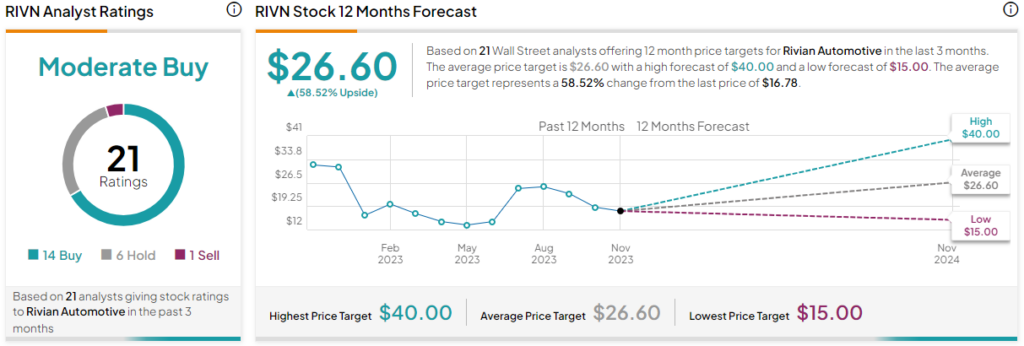While single-event catalysts such as earnings disclosures can have an unusually large impact on an exciting enterprise like Rivian Automotive (NASDAQ:RIVN), investors should really focus on the bigger picture. Unfortunately, said picture suggests that market participants may need to unplug the upstart EV manufacturer. The reality is that while fundamentals can be slow to reflect issues, they usually don’t lie. As such, I am bearish on RIVN stock.
Meet Your ETF AI Analyst
- Discover how TipRanks' ETF AI Analyst can help you make smarter investment decisions
- Explore ETFs TipRanks' users love and see what insights the ETF AI Analyst reveals about the ones you follow.

Rivian’s Q3 Earnings Were Good but Not Great
With questions rising about the underlying EV sector, Rivian arguably needed an outstanding earnings print for the third quarter (which was reported yesterday). To be sure, the company posted some encouraging stats. However, these stats might not be enough to instill sustained credibility for RIVN stock.
What captured most of the attention was Rivian’s sales haul. At $1.34 billion (up 150% year-over-year), it beat Wall Street’s consensus view of $1.31 billion. On the bottom line, the EV startup reported a net loss of $1.37 billion. This compares favorably to the net loss of $1.72 billion in the year-ago period.
Further, management upped its production guidance for the full year. It now anticipates 54,000 units, an increase of 2,000 vehicles. As well, Rivian will end its exclusivity deal with Amazon (NASDAQ:AMZN) for its electric-powered delivery van. This move should open avenues for broader customer reach.
Still, even with the generally positive Q3 results, viability remains a key concern. Notably, cash and cash equivalents declined to $7.94 billion from $9.26 billion in Q2. Given the capital-intensive nature of the automotive industry, investors will want to see a credible path to profitability.
With the cheapest Rivian model coming in at $73,000, that’s going to be a tough ask. Frankly, consumer economic data shows fewer people willing to fork over that kind of money.
The Bigger Picture Presents a Worrying Backdrop for Rivian
Setting aside the Q3 earnings results, investors now need to focus on what lies ahead. Unfortunately, big-picture economics point to slowing demand for EVs. And even if the interest in making the transition to electric mobility jumps sharply, consumers generally have less disposable money these days to acquire new vehicles. That’s a huge problem for RIVN stock.
First, as multiple news agencies reported, EV inventory at dealership lots is rising. Specifically, a CNBC report indicated that in August, it “took about twice as long to sell an EV in the U.S. as it did the previous January.” Consequently, EV days’ supply (the number of days it would take to sell all inventory) stood at around 111 days in early July and 97 days last month. In contrast, combustion-powered cars saw supplies range between 52 and 58 days.
Second, while consumer spending has overall remained surprisingly robust in the face of high inflation and borrowing costs, some cracks in this exuberant sentiment are beginning to materialize. Naturally, the rising EV inventory represents one significant sign. Moreover, the once-vaunted “revenge travel” phenomenon of consumers committed to enjoying social-related experiences has started to wane, evidenced by a decline in revenue passenger miles for U.S. air carriers between April and July this year.
With EVs sporting higher prices relative to their combustion-powered counterparts, they’re more likely to absorb the brunt of the damage as consumers look to save money.
Third, consumers don’t have the appetite for certain big-ticket items. As I stated in earlier articles for TipRanks, the average age of vehicles on U.S. roadways continues to rise higher and hit fresh records. Last year, it was 12.2 years. This year, this metric lands at 12.5 years. If the bulk of consumers – that is, middle-income households – were buying EVs at scale, one would expect this statistic to decline.
Combined with more Americans growing concerned about EV-related inconveniences, that’s not a great backdrop for RIVN stock.
Options Traders Don’t Seem Confident
Heading into Rivian’s Q3 earnings disclosure, options traders began placing bullishly-oriented big block trades on RIVN stock. At face value, this dynamic suggests that institutional investors have become optimistic about Rivian’s chances. However, several of these trades were sold puts, essentially meaning that institutional players have set their strike prices at levels they’re comfortable buying at in case the put options get exercised.
For the sold puts placed last Friday, many of the contracts feature a strike price of $12.50. That’s a significant drop from RIVN’s current price (just under $17). Additionally, several institutional players are straight-out buying puts, which are bearish bets.
Is RIVN Stock a Buy, According to Analysts?
Turning to Wall Street, RIVN stock has a Moderate Buy consensus rating based on 14 Buys, six Holds, and one Sell rating. The average RIVN stock price target is $26.60, implying 58.5% upside potential.

The Takeaway: RIVN Stock Faces Ugly Fundamentals
Irrespective of the Q3 earnings print, the main point regarding RIVN stock is that it faces ugly fundamentals. Basically, Rivian and other EV upstarts have the unenviable task of convincing consumers in a high-inflation-and-interest-rate environment to buy a more expensive product than that which they’re used to. This is a challenging task, evidenced by the high inventory of EVs relative to ICE vehicles. Thus, it’s difficult to see a positive route forward.
















